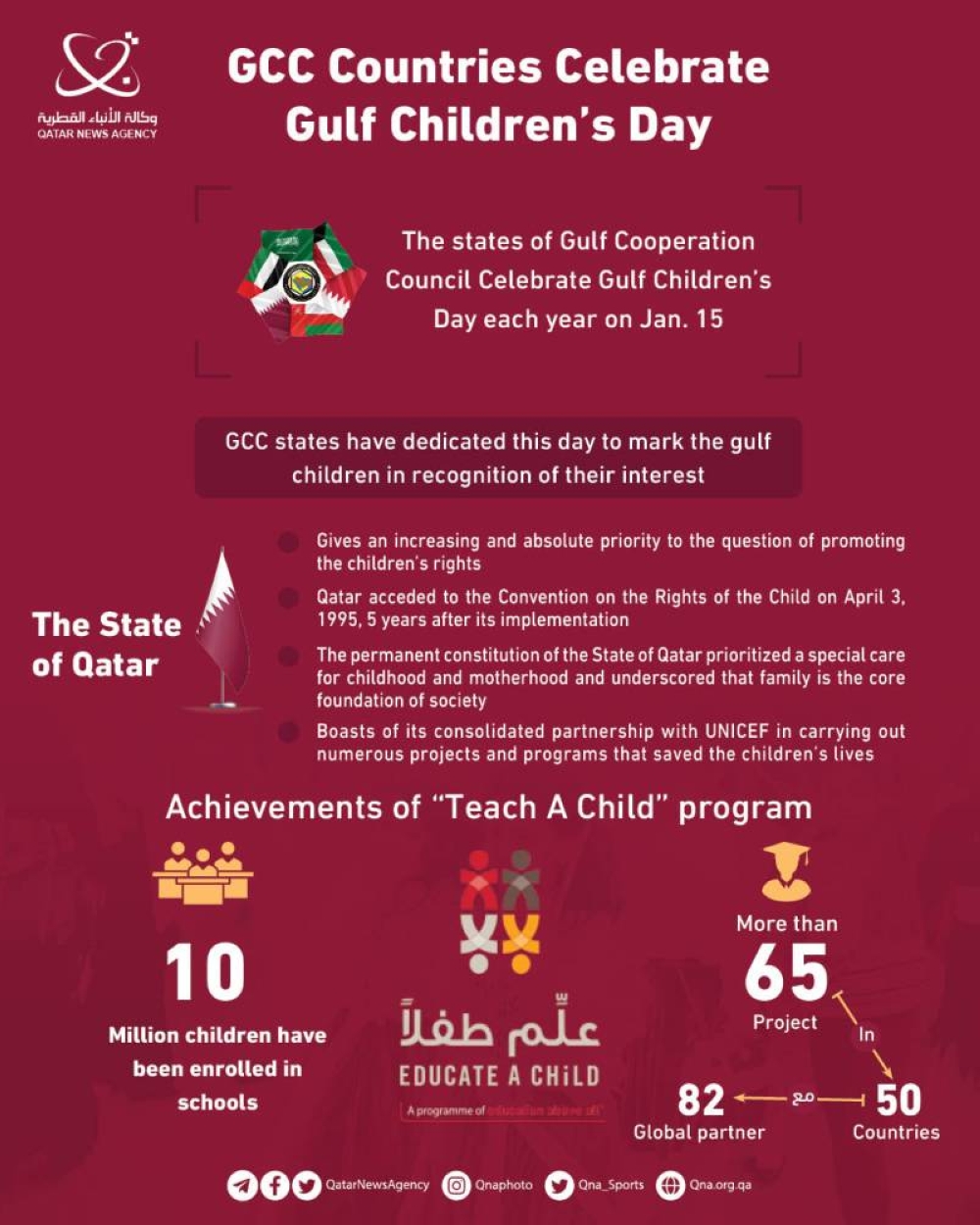The Gulf Cooperation Council (GCC) member states mark the Gulf Children's Day on Jan. 15, each year stemming from their consolidated belief that they represent the youth of tomorrow and protectors of homeland who should be perfectly brought up by instilling the religious, national and social principles in their spirits.
The GCC states celebrate this day in recognition of their interest in educating them to be a vibrant extension of humanitarian customs and traditions which the region's countries and people boast of.
Subsequently, Qatar gives an increasing and absolute priority to the question of promoting the children's rights and protecting them at local, regional and international levels, and ensuring full implementation of the provisions of the Convention on the Rights of the Child which was ratified by Qatar on Apr. 3, 1995.
The State of Qatar's national endeavours, along with its engagement in the international efforts dedicated to promoting and protecting the child's rights primarily stem from the principles enshrined in the permanent constitution of the state, which stated that the state's foreign policy underpins the principle of respect for human rights and repudiation of violence.
The permanent constitution of Qatar prioritised a special care for childhood and motherhood and underscored that family is the core foundation of society, as the law regulates the ample means of protecting the family, safeguarding motherhood, childhood and ageing accordingly.
The State of Qatar's interest in children's rights and protection is substantiated by the establishment of several governmental and non-governmental institutions relevant to protection of children's rights and implementing everything related to the provisions of the international convention with its comprehensive and indivisible sense. The Qatar National Vision 2030 has vital themes relevant to children, especially in the area of education, capacity development, as well as all aspects of preventive and therapeutic health care, considering the various child's requirements.
Qatar believes in the vital and fundamental role of education in protecting the children and empowering them in realising their rights, in addition to their transition to be effective decision-makers through building the essential capabilities to obtain job opportunities in the future.
The interest of Qatar in education did not confine to merely afford such a right to its citizens and the residents on its land, but went beyond that to encompass the adoption of international and regional initiatives that aim to offer good education for millions of underprivileged children due to poverty, armed conflicts, disasters and discrimination.
In this context came the launch of the "Protect Education in Insecurity and Conflict" programme, which is a founding member of the Global Alliance to Protect Education from Attacks, as well as the "Educate a Child" programme, which succeeded as an unprecedented initiative in enrolling 10 million children in school through the implementation of more than 65 projects in 50 countries, in partnership with 82 global partners.
Qatar has a consolidated partnership with UNICEF in carrying out numerous projects and programmes that saved the children's lives and defended their rights.
Celebrating Gulf Children's Day aims to draw a smile on the faces of innocent children, raise their level of interest and sense of life, raise awareness of proper education methods for children, and avoid violent methods that lead to psychological complexes. It also aims to instill concepts of Gulf identity in children, focusing on the rights guaranteed by law in various GCC countries, disseminating legal and societal culture to introduce their rights, raising awareness among children about the importance of the media, teaching them to clearly express their opinions, demands and needs through the media, and improve their conditions in the GCC countries, leading to excellence.
The celebration of Gulf Children's Day includes many national events and activities. Children wear national dresses and carry flags of their respective national identities. On this occasion, institutions, schools, educational centres, and institutions related to children organise various events and provide children with information about their Arab and Gulf origins. The historical ties and connections between the Arab Gulf countries are also presented while showing the most important resources that exist in these countries.
The celebration of Gulf Children's Day is considered an occasion to commemorate children, so that they become a contributing part of building a strong, constructive, creative, generous, and effective society, without detaching from their gulf heritage, values, and principles.
By allocating a Gulf Children's Day, the GCC countries work to raise awareness of proper education methods for children and highlight their rights, the most important of which are health and education. The GCC Statistical Center pays great attention to children through the issuance of many booklets and animated films to educate children about the Gulf spirit in an entertaining and objective manner that is suitable for the target age group to instill in children Gulf unity.
The centre is also concerned with the proper upbringing of children, as its programmes have witnessed increasing development and growth. It works to provide a suitable family environment for children through family educational programmes and guides the family in dealing with their children, while paying attention to the social education of children and the family environment affects their upbringing, education, and good guidance.
In its programs, it pays special attention to enriching the Arab children's space with cultural and scientific books, and educational stories that benefit the educational and community milieu.

